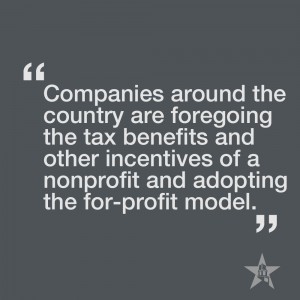It seems quite natural to assume that a Christian’s vocation lies somewhere in the nonprofits. Their goal of serving the public seems to mesh well with the Christian calling of serving others. Why would any Christian look for employment in a company that exists to maximize shareholders’ wealth? Well, if this model describes all for-profit companies, then that general assumption would be warranted; however, many charitable organizations are finding that the for-profit model allows them freedom, and that this extra freedom is worth any tax incentive that the government can offer.
 NIKA Water, a small for-profit bottled water company, donates 100% of its profits to bring clean water and safe sanitation to less developed areas around the world. Jeff Church, Co-Founder of NIKA, claims that the for-profit model allows them more autonomy over their giving and doesn’t tie them down to donors. He stated, “NIKA’s model is one that doesn’t need to rely on economic cycles or donor priorities but rather it uses the market place to create the profits which are then contributed back into the causes. Businesses such as NIKA are challenging to get to a critical mass level but if done correctly they can result in a steady stream of profits to be donated.”
NIKA Water, a small for-profit bottled water company, donates 100% of its profits to bring clean water and safe sanitation to less developed areas around the world. Jeff Church, Co-Founder of NIKA, claims that the for-profit model allows them more autonomy over their giving and doesn’t tie them down to donors. He stated, “NIKA’s model is one that doesn’t need to rely on economic cycles or donor priorities but rather it uses the market place to create the profits which are then contributed back into the causes. Businesses such as NIKA are challenging to get to a critical mass level but if done correctly they can result in a steady stream of profits to be donated.”
NIKA isn’t alone in their philosophy. Companies around the country are foregoing the tax benefits and other incentives of a nonprofit and adopting the for-profit model. Toms Shoes, commonly mistaken as a nonprofit company, adopted the model for similar reasons. Blake Mycoskie, founder of Toms, stated, “We’ve never had to ask anyone for a donation and that shows that you can sustain giving through the power of commerce.” This charitable trend towards the for-profit model has led to the creation of two new entities: the benefit corporation and the L3C. These dual-purpose organizations focus on turning a profit as well as creating a general public benefit. The tax exemptions vary for each, and though there are obvious issues with the dual-purpose model, I mention these new types of corporations because of what they highlight. They show that society is seeing business in a new light. People are starting to understand both the importance of the profit seeking model and the importance of using it for the public good. All this to say, if Christians limit themselves to seeking only nonprofit work, they are not only failing to see the big picture, but could also be missing out on for-profit companies who are just as focused on serving the public.
Now, for the Christians who have no issue with the whole for-profit vs. nonprofit debate but still find “the helping professions” more noble than the others I would again say the same thing. It’s not that going into the medical field, missions, or any of the obvious helping professions (as I’ve termed them) is wrong but it is important for Christians not to limit themselves based on their preconceived ideas of a worthy calling.
A passage from Matthew comes to mind: “Many will say to Me on that day, ‘Lord, Lord, did we not prophesy in Your name, and in Your name cast out demons, and in Your name perform many miracles?’ And then I will declare to them, ‘I never knew you; depart from me, you who practice lawlessness.”
Why do I mention this? Because in the grand scheme of things Christians who are overly concerned about whether to work in nonprofit or for-profit businesses, helping professions or business management, have most likely missed the point. You can spend your entire life looking for occupations that fit well into a “Christian” resume but God’s calling should trump all. Keep an open mind, follow the call of Christ, and don’t let the negative connotations of a for-profit business inhibit you from living out God’s call in the for-profit world.
